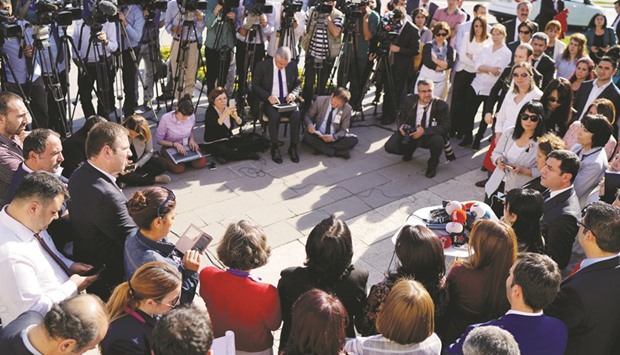Turkey’s parliament has adopted a highly controversial bill that would lift immunity for dozens of pro-Kurdish and other MPs and could see them evicted from parliament, sparking fresh domestic and international concern.
German Chancellor Angela Merkel will raise concerns over the legislation during a meeting with President Recep Tayyip Erdogan next week, her spokesman said.
The EU is pressuring Ankara to narrow its definition of terror to stop prosecuting academics and journalists for publishing “terror propaganda”.
The bill was backed by 376 MPs in the 550-seat legislature, parliament speaker Ismail Kahraman said, meaning that it will become law directly without being put to a referendum.
Only 140 voted against the measure.
Under current law, Turkish lawmakers have the right to full immunity from prosecution.
The bill – which still needs Erdogan’s approval before becoming law – would lift the immunity of 138 deputies from all parties who face potential prosecution.
The pro-Kurdish Peoples’ Democratic Party (HDP) says the measure is aimed at expelling its members from parliament.
The move could see dozens of HDP deputies facing criminal prosecution and losing parliamentary seats on accusations of supporting the outlawed Kurdistan Workers’ Party (PKK), which has waged a three-decade insurgency in the southeast.
Erdogan has repeatedly made clear that Turkish authorities see “no difference” between individuals carrying weapons or indulging in “terrorist” propaganda.
Aykan Erdemir, senior fellow at the Foundation for Defence of Democracies, said that the law would be a “sword of Damocles” hanging over the heads of opposition deputies, particularly pro-Kurdish MPs.
“This is a historic step toward the dismantling of parliamentary democracy in Turkey. Turkey has taken another big step toward authoritarianism and one-man rule,” he told AFP.
Should a number of HDP deputies leave parliament, it would ease the way for Erdogan to realise his dream of changing the constitution to create a presidential system and further beef up his powers.
The HDP, the third largest party group in parliament, has said that the bill could lead to the prosecution of 50 HDP deputies out of its total contingent of 59.
Selahattin Demirtas, the HDP co-leader who is already the target of criminal investigations, blasted what he termed a “coup” and said: “Parliament belongs to people, not the fascists.”
He said that the party would use all legal means including resorting to the top constitutional court to annul the law.
Erdogan’s government sees the HDP as political front for the PKK considered a terrorist group by Ankara and its Western allies.
Following the collapse of a two-year ceasefire in summer 2015, Turkey has been waging an intensive offensive against its militants and the renewed conflict has claimed hundreds of lives.
Yesterday Erdogan lauded the “historic” vote in parliament and said: “My people do not want to see guilty lawmakers in this parliament especially the supporters of the separatist terrorist organisation.”
The legislation set off alarm bells over the state of democracy in a country aspiring to join the European Union.
“For the domestic stability of every democracy, it is important for every relevant group in society to be also represented in parliament,” Merkel’s spokesman Steffen Seibert said.
“The situation will certainly be raised by the chancellor on the sidelines of the humanitarian summit with Turkey’s president,” he added, referring to the two-day gathering in Istanbul.
Merkel, who spearheaded efforts to conclude a migrant deal with Ankara, has become a target of criticism for compromising on rights abuses in Turkey in return for its co-operation on curbing Europe’s worst migrant crisis since World War II.
EU interior ministers meanwhile adopted yesterday a so-called emergency brake that would allow the bloc to swiftly halt visa-free access to Europe for Turks and other nationalities if key conditions were violated.
Visa-free travel to the EU is a key demand by Ankara in exchange for taking back migrants who land in Greece under the migrant deal and Erdogan has ruled out any change to Turkey’s counter-terror laws while its army is battling PKK militants.
The Turkish parliament’s session opened with a group of opposition Republican People’s Party (CHP) lawmakers walking out in protest against parliament speaker Kahraman, who stirred controversy in April when he proposed a religious constitution.
Before leaving the parliament floor ahead of the secret ballot, MPs chanted: “Turkey is secular and will remain so.”
The bill sparked violent scuffles in parliament this month with frustrated lawmakers exchanging fisticuffs and kicks.
And it received initial support in a secret ballot on Tuesday.

Co-chairs of the pro-Kurdish Peoples’ Democratic Party (HDP) Selahattin Demirtas and Figen Yuksekdag are flanked by fellow lawmakers as they attend a news conference at the entrance of the Turkish parliament in Ankara.
